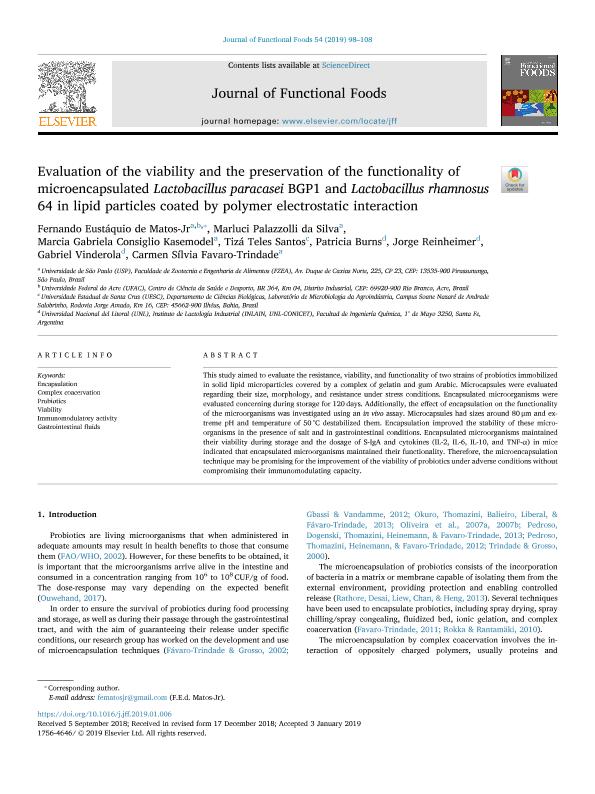Artículo
Evaluation of the viability and the preservation of the functionality of microencapsulated Lactobacillus paracasei BGP1 and Lactobacillus rhamnosus 64 in lipid particles coated by polymer electrostatic interaction
Matos-Jr, Fernando Eustáquio; Silva, Marluci Palazzolli; Kasemodel, Marcia Gabriela Consiglio; Santos, Tizá Teles; Burns, Patricia Graciela ; Reinheimer, Jorge Alberto
; Reinheimer, Jorge Alberto ; Vinderola, Celso Gabriel
; Vinderola, Celso Gabriel ; Favaro-Trindade, Carmen Sílvia
; Favaro-Trindade, Carmen Sílvia
 ; Reinheimer, Jorge Alberto
; Reinheimer, Jorge Alberto ; Vinderola, Celso Gabriel
; Vinderola, Celso Gabriel ; Favaro-Trindade, Carmen Sílvia
; Favaro-Trindade, Carmen Sílvia
Fecha de publicación:
01/2019
Editorial:
Elsevier
Revista:
Journal of Functional Foods
ISSN:
1756-4646
Idioma:
Inglés
Tipo de recurso:
Artículo publicado
Clasificación temática:
Resumen
This study aimed to evaluate the resistance, viability, and functionality of two strains of probiotics immobilizedin solid lipid microparticles covered by a complex of gelatin and gum Arabic. Microcapsules were evaluatedregarding their size, morphology, and resistance under stress conditions. Encapsulated microorganisms wereevaluated concerning during storage for 120 days. Additionally, the effect of encapsulation on the functionalityof the microorganisms was investigated using an in vivo assay. Microcapsules had sizes around 80 μm and extreme pH and temperature of 50 °C destabilized them. Encapsulation improved the stability of these microorganisms in the presence of salt and in gastrointestinal conditions. Encapsulated microorganisms maintainedtheir viability during storage and the dosage of S-IgA and cytokines (IL-2, IL-6, IL-10, and TNF-α) in miceindicated that encapsulated microorganisms maintained their functionality. Therefore, the microencapsulationtechnique may be promising for the improvement of the viability of probiotics under adverse conditions withoutcompromising their immunomodulating capacity.
Palabras clave:
ENCAPSULATION
,
COMPLEX COACERVATION
,
PROBIOTICS
,
IMMUNOMODULATION
Archivos asociados
Licencia
Identificadores
Colecciones
Articulos(INLAIN)
Articulos de INST.DE LACTOLOGIA INDUSTRIAL
Articulos de INST.DE LACTOLOGIA INDUSTRIAL
Citación
Matos-Jr, Fernando Eustáquio; Silva, Marluci Palazzolli; Kasemodel, Marcia Gabriela Consiglio; Santos, Tizá Teles; Burns, Patricia Graciela; et al.; Evaluation of the viability and the preservation of the functionality of microencapsulated Lactobacillus paracasei BGP1 and Lactobacillus rhamnosus 64 in lipid particles coated by polymer electrostatic interaction; Elsevier; Journal of Functional Foods; 54; 1-2019; 98-108
Compartir
Altmétricas



